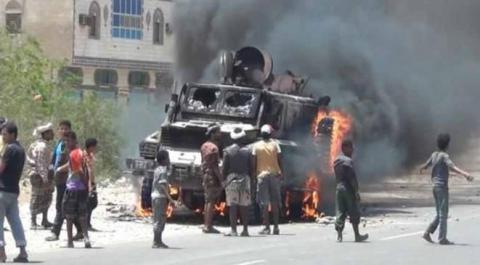Yemen's economy falters due to persistent political instability, Analysis


The World Bank has suspended its operations in Yemen this week, which adds to blows to the country's economy which has been faltering due to persistent political instability.
Meanwhile, the shutdown of the bank's office in Sanaa deepens the economic isolation after more than a dozen countries shut down their embassies and halted aid following the Houthi militants' seizure of power.
A senior official at the planning and international cooperation ministry expected the economic growth will be more than minus 10 percent this year due to deep recession, sharp drop in national incomes and other challenges including suspension of the foreign aid.
"The public investment program has been suspended since 2011 and foreign investments have been fleeing due to security concerns and poor basic services. There is no room to talk about development or positive growth at the present time," the official said, requesting anonymity.
The economic deterioration is being reflected on poverty and unemployment rates which are expected to rise above 60 percent this year.
Research centers said recession has forced many small and medium enterprises to announce bankruptcy and large layoffs coinciding with UN statements that around 61 percent of the country's population are facing hunger.
In addition, foreign currency reserves which declined from 5.1 billion U.S. dollars in September 2014 to current figure of 4.3 billion dollars could be used up and the flow of investments freezed amid growing concerns by investors, they added.
DEEP RECESSION
Analysts have warned of the deep recession which has been estimated between 50 and 70 percent at all sectors especially the investment, financial and energy sectors.
The flow of investments dropped sharply by 92 percent in 2013 compared with 2009, said Marzouk Mohsen, executive director of the economic and social development researches center, adding that more investors will leave Yemen due to the persistent political crisis.
"If we talk about statistics, the situation is shocking. For example, the U.S., European and Gulf investments now account for only one percent of the total continuing investments in the country," he said.
Southeast Asian countries whose investors are pumping money to markets worldwide have around three percent of foreign investments in Yemen, he added.
In the end, political instability will affect investors' trust in the Yemeni currency and that in turn could hurt financial status and bilateral trade between Yemen and others, he said.
The trade between Yemen and other countries reached 21 billion U.S. dollars in 2013.
Meanwhile, the national economy is facing another problem which lies in continued fall of national incomes, especially energy earnings that contribute around 70 percent to the budget.
Nasr Mustafa, head of the studies and economic media center, said the oil and gas earnings dropped by 50 percent between 2011 and 2014.
"Big oil firms have left and almost all exploration operations have been suspended mostly for security concerns," he said.
"The worse is to come amid signs of further violence and conflicts that could lead to a halt to oil and gas exports," he elaborated.
In the past few months, several companies including Nexen and Dove Energy gave up their energy projects in Yemen citing security concerns and falling outputs coinciding with falling oil prices.
RECONSILIATION TOPS AGENDA
Despite signs the national economy is faltering and heading to a catastrophic status, some indicators showed the situation can be contained at least for months ahead.
Governor of the Central Bank Mohammed Bin Hamam has admitted that the country's incomes are falling while playing down huge impacts on livelihoods.
"Falling oil prices have largely affected the budget resources but the impact will not be severe. Here is why: the bills for imports of basic products will be less than usual," he was cited by the official Saba news agency.
"For now, the situation is under control as the foreign currency reserves remain at a safe level. The reserves can cover bills for basic products for more than three months and this is still a good sign," Bin Hamam said.
Moreover, the government has lately announced the taxes revenues and money transfers increased last year, both reached around five billion dollars.
The taxes and remittances by Yemeni expatriates are key resources that will help if the authorities streamline laws and mechanisms to develop the two resources, officials from the finance ministry said.
However, officials and analysts affirmed that solving the political crisis should come on top of necessary measures to stop accelerating economic deterioration.
Adnan Al-Sanawi, a professor at Sanaa University, said political stability is necessary for restoring economic cooperation ties with other countries and resuming investments.
"In addition, Yemenis should demonstrate ability to absorb foreign aid in order to convince donors to resume their aid," he said.
Radhwan Al-Hamdani, an analyst based in Sanaa, said the government has already taken key steps to address budget deficit and financial problems including suspension of all expenditures except salaries. "The government is currently giving basic salaries. Bonuses and other funds for employees have been cut."
(Xinhua)

Hadramout — UNESCO has officially inscribed Al-Dan Hadrami, a traditional poetic and musical art form from Yemen’s Hadramawt region, on…

NewYourk  -- The renowned auction house Sotheby’s has revealed plans to present one of the rarest surviving Yemenite Torah scrolls in it…

Aden — The Ministry of Agriculture and Irrigation in Yemen has issued a new decision prohibiting the hunting and trade of sea turtles, as par…